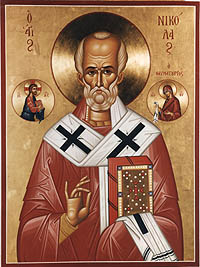Our father among the saints Nicholas of Myra, Wonder-worker, was the archbishop of Myra in southern Asia Minor in the fourth century, known especially for his care for the poor. He is also the basis for the Santa Claus legends and imagery which accompany Christmas celebrations in much of the world, derived from the Dutch celebration of his feast day as the patron saint of sailors (Sinterklaas).
While widely honored and venerated, not only in the Orthodox Church, but throughout most Christian groups, little is known historically of the life of Nicholas. He is known to have been archbishop of Myra and he may have participated in the Council of Nicea in 325. In addition to being honored as the patron saint of many countries, notably Greece and Russia, and of cities, he is the patron of many occupational groups, most notably of sea-farers. St. Nicholas is commemorated by the Church on December 6, and also on May 9 (the transfer of his relics) and on July 29 (his nativity).
Life and tradition
By tradition, Nicholas born in the province of Lycia in the southern part of Asia Minor in the city of Patara to well-to-do parents. The date of his birth is not known. Having inherited his parents' estate, he became known for his generous gifts to those in need. As a youth, he made pilgrimages to Palestine and Egypt. He was subsequently consecrated Archbishop of Myra as the fourth century began. He was imprisoned during the persecutions of Diocletian and released by Constantine after his ascension to emperor. Nicholas was noted for his defense of Orthodoxy against the Arians. He is reputed to have been present at the Council of Nicea, but his name does not appear among any documents from that era. He died in Myra on December 6 in a year uncertain, but between 342 and 352.
Many of the details of his life that we have appeared during medieval times. St. Methodius, Patriarch of Constantinople, in the middle of the ninth century produced a life of Nicholas in which he noted that the life of Nicholas was unknown to most of the Christians of the time, thus indicating his composition was probably based mainly on legend. Methodius noted that Nicholas was raised well by pious and well-to-do parents and related how Nicholas contributed from his inheritance the dowry for three daughters of a citizen of Patara who had lost all his money.
His feast was being celebrated by the time of St. Justinian two centuries after his death. After Methodius' life of Nicholas became available, Nicholas was acclaimed and honored throughout Europe and especially in Italy. When Myra was captured by the Saracens in 1034, many Italian cities planned to "rescue" his relics. In 1087, forces from Bari, Italy, attacked Myra and carried away his relics from the lawful Greek guardians in Myra to Bari where they were enshrined in a new church. His fame increased. The story of his rescue of sailors in the Aegean Sea during his lifetime established him as the patron of mariners. His popularity in Russia rose to the point that almost all churches had some sort of shrine honoring St. Nicholas.
Secular fame
In time his fame in northern Europe as a saintly bishop began changing to that of a giver of gifts to children, usually done on December 6. As immigrants from the Germanic and Nordic lands settled in the United States the image of St. Nicholas, or "Sinterklaas," as he is known among the Dutch, slowly changed to that of "Santa Claus" with little tie to the spirituality of Christianity.
Hymns
Troparion (Tone 4)
- In truth you were revealed to your flock as a rule of faith,
- an image of humility and a teacher of abstinence;
- your humility exalted you;
- your poverty enriched you.
- Hierarch Father Nicholas,
- entreat Christ our God
- that our souls may be saved.
Kontakion (Tone 3)
- You revealed yourself, O saint, in Myra as a priest,
- For you fulfilled the Gospel of Christ
- By giving up your soul for your people,
- And saving the innocent from death.
- Therefore you are blessed as one become wise in the grace of God.
See also
External links
- St Nicholas the Wonderworker and Archbishop of Myra in Lycia (OCA site)
- Nicholas the Wonderworker, Archbishop of Myra (GOARCH)
- Saint Nicholas the Wonderworker
- Nicholas of Myra Catholic Encyclopedia
- Icon of St. Nicholas, Archbishop of Myra in Lycia
- St. Nicholas Center Discovering the truth about Santa Claus
